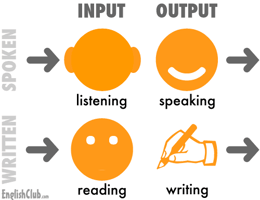Being fluent in English means being able to communicate effectively using English. While we aspire...
English @ Work vs. General English: What’s the Difference?
What is General English?
General English is the ability to navigate everyday communication—both formal and informal—with effectiveness and ease.
It includes reading, writing, speaking, and understanding the language. But it’s more than that. It’s also about navigating cultural differences, building bridges, and adapting to new situations.
Think of it this way: a journalist may need strong writing skills, while a teacher relies on clear spoken communication. Both are drawing from General English, but their needs look different.
And one truth always remains: there is no end to learning a language. There is always something new to discover.
What is Business English?
Business English is the use of English in workplace contexts.
Workplaces come with their own language—specialized jargon, industry terms, corporate lingo. To an outsider, this may sound like “just jargon,” but within a company, it becomes part of the culture.
Business English proficiency can range from simple day-to-day communication to high-level public presentations. A scientist or lawyer may need strong writing skills, while a leader must master nuance and clarity when speaking.
Why Business English is Context-Specific
The level of Business English you need depends on your role.
- For many jobs, B2 level English plus training in industry jargon is good enough.
- Roles that involve complex human interaction and leadership demand higher proficiency.
- Even someone with B1 General English can deliver a good presentation—if prepared and supported.
Business English isn’t about perfection. It’s about having the communication skills needed to get the work done.
The Human Side of Business English
At the heart of every workplace interaction is a person.
Business English has two layers:
- Contextual – the jargon and professional language of your industry.
- Self-expressive – your ability to think clearly before you speak.
If your objectives aren’t clear, your communication won’t be either. Workplace conversations are usually goal-driven. But relationship-building also matters, and those conversations are often more open and unstructured. Both are important.
A Simple Rule to Remember
- Meaning comes before language.
- Fancy words are useless if they don’t make sense. It is always better to make small mistakes in accuracy than to miss the meaning completely.
- When in doubt, keep it simple. And when you don’t understand, ask.
Key Takeaway
General English is your foundation. Business English builds on that foundation with the skills, vocabulary, and clarity you need to thrive at work.
The bottom line?
Business English is communication with a purpose.
At Tripti Coaching, we help professionals strengthen their Public Speaking, Business English, and Communication skills so they can express themselves clearly and confidently at work.
If you’re ready to grow in your workplace communication, let’s talk.
.png?width=200&height=200&name=Tripti%20(2).png)


